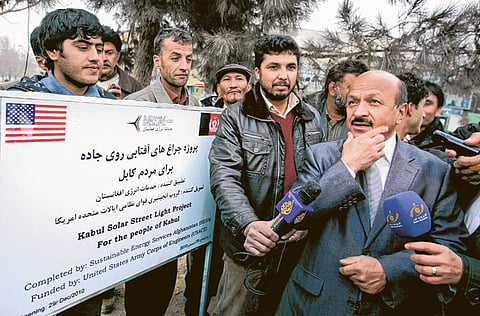Earning respect, for a change
Kabul mayor's latest moves have broken the stereotype of the bad politician

Of all the fool's errands in Afghanistan, being mayor of Kabul has to be near the top of most cynics' lists. In the past eight years, the city's population has mushroomed from 1.5 million to nearly 5 million without any formal planning, most of the roads are unpaved and whatever limited services the city offers often seem to exist more in theory than in practice.
Even the title "mayor of Kabul" rarely denotes the actual mayor himself. Most often it is used by critics of Afghan President Hamid Karzai to deride him for his perceived inability to control the regions beyond the capital city.
But Kabul does have a real mayor. His name is Mohammad Younus Nawandish — and despite all the challenges he has had to face, he has managed to become one of the most respected and arguably one of the most effective politicians in the whole of Afghanistan.
"We haven't had a mayor like this for at least nine years," says Mohammad Omar Naemyar, a founding member of the Kabul Residents' General Council, an independent citizens' organisation. "Since the day the new mayor was appointed, things have become more lively in Kabul. The municipality is doing some fundamental work that we've been waiting on for too many years."
A new type of politician
After less than a year on the job, it is clear that Nawandish is a departure from the type of politicians Kabul has known over the past 30 years.
His office boasts, among other achievements, of having repaired more than 840 square metres of road, paved tens of kilometres of new roads that have helped alleviate traffic, planted more than 12,500 square metres of grass and provided 15,053 homes to the poor or the homeless.
Within the next year, the mayor has pledged to pave all major roads in Kabul. It is an ambitious decree but one the mayor says he is confident he can fulfil.
Considering Nawandish's lofty mayoral ambitions, it may come as a surprise that this was never a job he wanted. "I had no interest in being the mayor of Kabul, because I knew the situation and the problems in Kabul after living here for more than three decades," Nawandish says.
"For the past eight or nine years, Kabul has been ignored. There has been no big rebuilding in the city and the citizens were making lots of demands. There was a lot of work and we didn't have enough resources to do this. Also, the municipality was famous for corruption, so I didn't want to join this organisation."
He didn't even campaign. While the mayor is supposed to be elected, Kabul doesn't have the resources to hold an election right now. So President Karzai appointed him.
The last mayor of Kabul, Mir Abdul Ahad Sahebi, was indicted in a corruption scandal and sentenced by a judge to four years in prison. It was the first major corruption case after Karzai's fraud-tainted re-election. Many observers saw it as a test of the president's commitment to transparency.
When Nawandish got the offer, he felt it was his patriotic duty to take the job, despite his reservations. A civil engineer, his only prior political posting had been as deputy minister of water and energy.
Since taking the job, Nawandish has had little time to reflect on his decision. An average day for the mayor starts at 8am and ends at 1am. Kabul residents tell stories of spotting the mayor inspecting construction sites long after most citizens are asleep. Given this schedule, the mayor says he sees his daughter only for a few minutes every morning before she goes to school.
As with most government agencies in Afghanistan, one of the mayor's biggest challenges is the city's budget. Through taxes and fees, the municipality manages to generate about $30 million (Dh110.1 million) annually but the city requires hundreds of millions to meet its needs, says Nawandish.
One of the reasons he has managed to accomplish so much more than his predecessors may stem from his ability to find new sources of foreign aid for the city, say Afghans who follow Kabul politics.
"To be mayor of Kabul with the equipment and facilities this organisation has is very difficult," Nawandish says. "There are big demands from the people but we have little resources."
Anticorruption movement
Still, most Kabul residents say they are happy with what the mayor has managed to accomplish thus far, in particular with regard to his anticorruption initiatives.
Haji Hamidullah Haikal, a real estate agent in Kabul, says getting the required papers to sell property used to take months but now it only takes one or two weeks. Though he still pays bribes, he says it is not nearly as bad as before. Now when someone asks for a kickback, it happens under the table rather than in plain view, a sign that bribes are increasingly frowned upon.
"Paying bribes in secret has decreased the number we must pay," he says, "because civil servants are afraid to take them now."
Paved roads have let Mohammad Rasoul Rohimi expand his glass business. He used to spend extra time packing glass for delivery. Even so, it often broke on bumpy roads. Better roads mean he can work faster — and more goods arrive intact.
Past mayors "have wasted a lot of time and opportunities over the past nine years", Rohimi says. And now, "there are too many other high-level officials who are just sleeping and not nearly as active as this mayor".
Sign up for the Daily Briefing
Get the latest news and updates straight to your inbox



